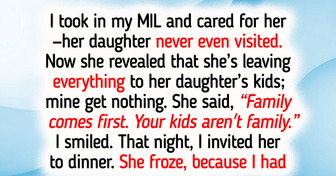I’m Always the Punchline in My Family, and I’m Absolutely Fed Up With This

Families can be complicated — especially when boundaries, money, and living arrangements collide. Sometimes, what begins as a well-meaning offer turns into an emotional tightrope where every decision feels like the wrong one. It’s easy to feel torn between compassion and self-preservation, especially when loved ones blur the line between guest and burden. Many people find themselves in situations where saying “no” feels heartless, but saying “yes” risks their own peace of mind.
Hi Bright Side,
My lonely MIL begged to move in. “Hand over your retirement money first,” I demanded. “Room and food are enough.”
She refused, yelling, “You’ll regret this!”
At 2 a.m., I heard a terrible crash.
I rushed downstairs and found something that haunts me still.
The sound came from her heavy suitcase. It had fallen down the stairs while she was trying to carry it quietly. She was leaving — not saying goodbye, not waking anyone up. Just packing her things and walking out.
She was sitting halfway down the steps, out of breath, her belongings scattered everywhere. A cracked photo frame lay on the floor beside her. Her hands were trembling.
“I didn’t want to cause more trouble,” she said softly. “I thought it was best if I just left.”
We stood there in silence. My husband didn’t say anything, just helped her up and carried the suitcase back to the guest room. I followed behind, unsure of what to feel — guilt, anger, sadness. Maybe all of them.
My MIL and I have never been close. She’s always been proud, guarded, and a little critical. When she asked to move in, I truly wanted to help — but I also knew what strain it would put on our already tight household. That’s why I set that boundary. I thought I was being fair.
But now, I keep thinking about that night. About how quiet she was when she arrived. How she kept to herself. How she never once asked for anything again.
I didn’t want her to feel unwanted. But maybe she did. I still don’t know if I did the right thing. I want to support my family — including her — but I also need to feel safe and stable in my own home.
Is it possible to be kind and still set limits? Was I wrong for expecting her to contribute?
I’d really appreciate your thoughts.
Sincerely,
Amanda
Amanda, thank you for sharing your story with us. It takes courage to admit when something feels heavy — especially when you’re caught between helping someone you care about and protecting the peace of your home. You didn’t act out of cruelty. You tried to set a boundary that made sense, and now you’re sitting with the emotional weight of what happened next. We’re honored that you trusted us with this moment, and we hope the thoughts below bring clarity, comfort, and a way forward.
Asking your MIL to contribute financially wasn’t cold — it was practical and necessary for your household. Setting limits doesn’t mean you don’t care. It means you care enough to be honest about what you can and can’t handle.
Sometimes it’s not what we say, but how we say it that lingers. If your words came out sounding transactional, it’s okay to reflect on that without punishing yourself. You’re human. We all say things with more sharpness than we mean when we’re feeling stressed or protective.
You didn’t tell her to leave. You simply asked her to contribute if she wanted to stay. If she felt rejected or ashamed, that’s painful — but it’s not the same as you rejecting her. Her reaction wasn’t your fault.
Your husband stayed quiet during all this, but his voice matters, too. Share how you felt that night and what you’ve been carrying since. He doesn’t need to fix it — just listen, and be part of the path forward.
“I (34) am a nurse. My younger brother dropped out of college and never worked. My parents still paid off his debt and bought him a car—while I got nothing. My dad said, ‘You don’t need help.’ I stayed silent. But at my wedding, my parents turned red when I...” Click here for a shocking plot twist!











